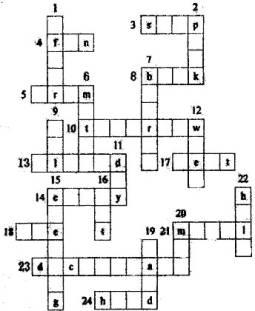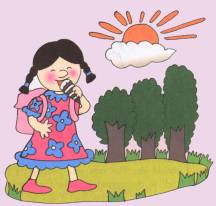 设为首页
设为首页
 加入收藏
加入收藏
学习方法建议
(-)本单元记忆单词的难点主要是关于星期的七个词。我们可以首先找出他们的共同点。每个单词后三个字母都是day,然后将符合读音规则的Monday,Tuesday,Thursday,Friday,Sunday放在一起按规则记忆。Wednesday和Saturday难度较大,进行特殊记忆。
(二)本单元的对话分为两大内容,一是购物二是借物品。我们可以在课上或课后自己创设环境,根据老师的要求进行相互对话,达到熟练掌握的目的。
(三)第87课是有关打电话的语言表达法。首先,我们了解到英美国家通话方式和中国通话方式的三点不同。回到家中可以跟你的英语老师或同班同学用英语通话。
(四)找出本单元的重点词组和句子。
词组:be closed, be open 24 hours, borrow sth. from sb. , give sth. back to, give sb. a hand, from. . .to, help sb. with sth.
句子: 1. I think the shop is closed at this time of day.
2. Look! It says “Closed”.
3. Let’s stay at home.
4. What day is it today?
(五)本单元的难点:通过理解,体会,辨析there be和have,has用法的不同点。
词语用法速记歌
dictionary是字典,shop商店记心间。
tomorrow名词意明天,CD意思是唱片。
Borrow动词意为借,from搭配才确切。
supermarket是超市,Sunday名词星期日,
after class下课后,have a rest做运动。
Monday一周第二天,开始学习和上班。
Wednesday是星期三,正是学习好时间。
Thursday是星期四,千万记住别忘事。
Friday是“黑色”.一不小心闯大祸。
Saturday是星期六,周末回家玩个够。
fun名词是“有趣”,hard副词是努力。
三者以上人或物。用all意思是全部。
early早,late迟,每天到校应及时。
give …a hand要记住,是给某人以帮助。
帮助某人做某事,help…with正合适。
(注:西方人认为星期五是很不吉利的,常把它称为黑色星期五,若正巧赶上是13号,就更认为不吉利了。)
学谚语记单词
1. Clothes do not make the man. 人不可貌相。
2. Money makes the mare(母马) go. 有钱能使鬼推磨。
3. The day has eyes, the night has ears. 要让人不知,除非已莫为。
4. Half wits(智力) talk much but do little. 才气不足者话多。
5. One today is worth(值) two tomorrows. 一个今天胜过两个明天。
6. The early bird gets the worm(虫). 捷足先登。
7. Tomorrow never(从不) comes. 切莫依赖明天。
8. Practice makes perfect. 熟能生巧。
9. One tree does not make a wood. 独木不成林。
10. The dictionary is the only place where success comes before work.
只有在字典里,成功才出现在工作之前。
你能找到下文中对上面九句话的解释吗?
A. Always start early when you do something.
B. People with high IQ do not talk too much. They are usually quiet.
C. He is in pour clothes. But he’s very learned.
D. It won’t do without money. But money is not everything.
E. Try to finish your work today.
F. Sooner or later people will learn about what you have done behind their backs.
G. Never talk about success, but try hard to make your work is success.
H. The more you work, the better you work.
I. Team work is important.
J. Make use of the effort given by as many people as possible.
星期名称的来历
大家都知道一周有七天,每一天都有一个名称。但是,你可知道它们的由来吗?
最早给星期中的每一天起名称的是古代埃及人和罗马人。他们以太阳、月亮和五大行星的名称作为一周七天的名称。即:
the day of the sun(太阳日),the day of the moon(月亮日),the day of Mars(火星日),the day of Mercury(水星日),the day of Jupiter(木星日),the day of Venus(金星日)和the day of Saturn(土星日)。
后来,富有创意的英国人用他们自己所信奉的神的名字来称呼一星期中的每一天。
Sunday(星期天,太阳神之日)——the day of the sun/ Sun’s day(献给太阳的日子)。
Monday(星期一,月亮神之日)——the day of the moon/ Moon’s day(献给月亮的日子)。
Tuesday(星期二,战神之日)——the day of Tiw / Tiw’s day(献给日耳曼神话中的战神Tiw的日子)。
Wednesday(星期三)——Woden’s day(献给Woden的日子,Woden为北欧神话中的主神,主管知识、文化、诗歌、战争等)。
Thursday(星期四,雷神之日)——Thor’s day(献给北欧神话中的雷神Thor的日子)。
Friday(星期五)——Freo’s day(献给Freo的日子,Freo是北欧神话中的主神Woden的妻子,主管婚姻和家庭)。
Saturday(星期六,农神之日)——the day of Saturn(献给Saturn的日子,Saturn是罗马神话中主管农业的神)。
day这个单词源自日耳曼语的daeg,原意是太阳照耀的时候。
HAVE/HAS 用法大观
have是英语中一个非常重要的动词,被戏称为“灵魂动词”或“魔鬼动词”。因其在不同的词组中,具有不同的含义,语法上称这类词为兼类词。现将have的用法简要归纳如下:
一、作“有”讲时,强调“所属关系”,表示“拥有”的意思。其主语常为人或物。如:
My father has many new books.
我爸爸有许多新书。
I have a new computer.
我有一台新电脑。
【注】there be句型表示“有”时强调“某处有某人或某物”,其用法此处不再详述。
二、“have + 表示一日三餐的名词”,意为“用餐”。如:have breakfast/ lunch/ supper吃早饭/午饭/晚饭。
三、“have + 表示食品、饮料等名词”,意为“吃;喝”。如:have (some) bread吃面包,have eggs(for breakfast)(早餐)吃鸡蛋,have (a cup of)tea喝(一杯)茶。
星期名词一点通
1.结构特点:星期名词都以day结尾,属于专有名词,使用时,每个名词的首字母都要大写。
2.读音特点:字母组合ay均读/ i /;另外Thursday和Saturday中都有字母组合ur,但读音不同。前者读/[:/,后者读/[/,即“四长六短”。
3.简写特点:星期名词一般都可用前三个字母来代替(Tuesday和Thursday有时用前四个字母。)
4.常用句型:对星期提问,一律用What day…?通常用下面三种方法表达:1.What day is it today? 2. What day is today? 3. What day of the week is it today?
5.用法须知:①在西方,Sunday is the first day. 星期天是一周的第一天。②表示“在星期几”,介词要用on;表示“星期几的上午、下午、晚上”,也要用介词on,而不用in。③星期名词前可用this、next等修饰。如:this Saturday这个星期六,next Sunday下个星期日。④周一至周五又被称作weekday(周日、工作日);周六和星期日被称作周末(weekend)。
6.习语集锦:①Sunday school主日学校 ②blue Monday烦闷的星期一 ③Sunday clothes盛装
周末赛场
I.下面是Han Meimei写的一段有关“星期”的话题,其中的一些关键词语,她还未写全。请你根据短文内容用最短的时间帮她填出来(单词首字母已给出)。
There are seven days in a w 1 . S_ 2 _ is the first day of a week. M_ 3 _ is the second (第二) day of a week. The last(最后的) day of a week is S 4 . In China, the students go to school five days a week. They go to school from M 5 to F 6 . On S__7__ and S 8 , they don’t go to s 9 . They watch TV at h 10 . They can go to s 11 with their mother to buy s 12 to eat. And they can go to s 13 in the lake.
Today is the first day of a week. We come to the park. Look! We are h 14 a good time. Some are p 15 games. Some are s 16 and dancing. Some boys and girls are r 17 up the hill. Where is Hu Ming? He is s 18 on the chair. What’s he doing? He is drawing. W 19 is Lily? She is on the grass. What is she doing? She is running after a beautiful butterfly (蝴蝶). She w 20 to catch it.
keys: 1.______ 2.______ 3.______ 4.____
5.______ 6.______ 7.______ 8._____
9.______ 10.______ 11.______ 12.____
13.______ 14.______ 15.______ 16.___
17.______ 18. ______ 19.______ 20. ______
II.读一读,圈一圈。
把你在短文中的读到的东西圈起来。
Hi! This is my bag of things for school. I have a pencil-case. There are two pens and four pencils in it. I don’t have any colour pens. I have an eraser and a small ruler. I don’t have a big ruler. I have one reading book and one writing book. I don’t have a spelling book and I don’t have a map.
III.在图中的空格内填入适当的字母,使横竖行都成为Unit 22所学的词语,并能填入相应的句子中。
1. He has many things to do _____ doss.
2. She goes to the ______ with her parents on Sundays.
 3.
There is a _____ near our school.
3.
There is a _____ near our school.
4. Today is a _____ day.
5. He has classes _____ Monday to Friday.
6. The are having a _____ doss now.
7. May I _____your bike.
8. Please give it _____ soon.
9. _____ of the students are working hard.
10. What day is it_____? It’s Tuesday.
11. I think the shop is dosed at this time of________.
12. There are seven days in a ________.
13. The bookshop is not _____ now.
14. The shop doses _____ on Fridays.
15. Could you come and help me mend my bike this _____?
16. —Thanks a _____. —That’s all right.
17. On Sundays, he has a good _____ at home.
18. If you want to draw a straight line, you must_____ a ruler.
19. We study very _____.
20. _____ I borrow your knife?
21. He wants to make a _____ plane.
22. On Thursday and Friday they _____ their fiends with their English.
23. May I use your _____?
24. Can you give me a _____?
短文欣赏
Mr. and Mrs. Green are a very forgetful couple. For example, Mr. Green sometimes goes to his office for work on Sunday morning, for he thinks it is Monday. And Mrs. Green sometimes forgets to wake up her daughter, Lucy, in the morning and forgets to cook breakfast for the family.
One summer, they plan to fly to New York for a visit. They get to the airport only fifteen minutes before the plane leaves. So time is short. But suddenly Mrs. Green says she must tell Lucy not to forget to lock the door when she leaves for school in the morning. As Lucy is on her way to school, they can’t reach her on the phone. So the couple hurries to the post office. Mrs. Green writes a short note to Lucy, when Mr. Green buys a stamp and an envelope. Soon the note is ready. They hurry to put the stamp on the envelope and drop it in the mailbox. But suddenly, Mrs. Green begins to cry. The short note to her daughter is still in her hand. She has put their plane tickets in the envelope.
根据短文内容,选择正确的答案,并将代号填入前边的括号内。
( )1.What did Mrs. Green put into the envelope?
A. A note B. A letter C. Two plane tickets D. Two cinema tickets
( ) 2. Where did they post the letter?
A. At home B. In New York C. At the airport D. In the plane.
1. 注释:
(1) forgetful 健忘的 (2) for example 例如
(3) plan 计划 (4) suddenly 突然地
(5) lock锁 (6) reach 与……联系上
(7) envelope 信封 (8) hurriedly匆忙地
(9)mailbox 信箱
2、思考题:
(1) Do you have a classmate like Mr. and Mrs. Green in your class? How do you solve (解决)this problem.
(2) Do you have a good method to help the forgetful person(人)?
I Like Summer Best
(我最喜欢夏天)
 Of
all the seasons, I like summer best. The weather is
very hot in summer. There are many flowers in the
parks. The sun shines brightly. I think it is nice
to have some soft drinks. I like to take some strawberry
ice-cream(草莓冰淇淋)very much.
Of
all the seasons, I like summer best. The weather is
very hot in summer. There are many flowers in the
parks. The sun shines brightly. I think it is nice
to have some soft drinks. I like to take some strawberry
ice-cream(草莓冰淇淋)very much.
Some people like going to the swimming pool. They can swim in it. It must be very comfortable(舒适的). Some of them also like going to the beach. Some children like to build sandcastles(沙堡)on the beach; so do I.
Sometimes it rains heavily. Sometimes there are typhoons(台风). The wind blows hard. It must be dangerous to go outside in this weather. We must be careful in such weather.
Jim Goes
to School
(吉姆上学)
Jim is five years old. He lives in a small town with his mother and father, and he is a happy boy.
One day, his mother says to him. “You are going to start school next Monday, Jim. You will like it. School is very nice. The children learn a lot of interesting things, and they play games, paint pictures. You like those things, don t you?”
“Yes, I do, Jim says. But how long am I going to stay at school, Morn?”
His mother answers, “I’ll(直到) you are sixteen, Jim.” Jim does not say anything.
On Monday, Jim puts his new school cap on, gets his new school bag, and his mother takes him to school. She takes him to his teacher, and says “Goodbye” to him. He goes into the classroom.
In class pupils play games, paint pictures, sing songs and do other nice things, but Jim cries most of the morning.
His teacher is a very nice young woman. She says, “Don’t cry, Jim. We re going to have our lunch soon, and then your mother is coming to take you home.”
Jim stops crying at once. “Am I going home today?” he asks.
“Yes, of course. School finishes (结束) at 3 o’clock,” his teacher says.
“But my mother says I’m going to stay at school until I’m sixteen,” Jim says.
His teacher smiles and says, “That’s right, Jim. But all the pupils and. teachers go home every evening, and they don’ t come to school on Saturdays, Sundays or holidays.”
Jim laughs when he hears that, and he is very happy again.
Now Jim likes school very much, and he sometimes does not want to go home when it is 3 o’clock.
养成学习语音的习惯
同学们都在学习英语,而且经常在听、说英语。可是我想提醒大家千万要在开始学习的阶段养成一个良好的语音习惯。为什么这样说呢?
大家知道,不论学习哪种语言,都是为了用以表达思想和进行交际的。语言,首先是有声的语言。凡是人说出来用来交流思想、表达感情的声音都叫做语音。为什么说学好语音至关重要呢?就是因为语音有区别词义的作用。比如,如果把full [ful] 读成[fu:l],那就是说,本来想说“满的”,结果说成了“傻子”,这不是闹出了笑话了吗?所以说,在一个单词中如果有一个音发错了,就会变成另外一个单词了。这就是语音的区别词义的作用。
英语的语音比较复杂,它和汉语拼音不一样。英语字母有它的名称音,如:a [ei],e [i],i[ai],o[[u],u[ju:],就是说,有时字母的发音就是它的名称音。可是在很多情况下发的并不是它的名称音。就拿元音字母a来说吧,它在不同的单词中就有六、七种不同的发音。所以说,字母的名称音和它在单词中的发音是两回事。
要想学好语音,除了注意模仿老师的正确发音、多听录音以外,还要掌握一点读音规则。虽然读音规则的例外情况很多,但总是还有一些基本规则的。比如,五个无音字母在重读开音节中都发它们的名称音;在重读闭音节中, a发[A]音, e[e]音, i发[i]音,o发[R]音,u发[Q]音。如果再学好国际音标,那么,连没学过的生词也能自己顺利地读出来了。不过要注意的是,汉语拼音、英语字母和国际音标在形态上大部分是一样的,在发音上有些虽然很相似,但是绝不相同,千万不可用汉语的发音方法来发英语的音,这一点特别重要。
为了帮助同学们练好语音,我们将从本期开始,陆续刊登一些有关元音字母发音问题的材料。在这里,首先谈谈:
[A]和[ai]的发音方法有什么不同?与[A]和[ai]相对应的字母是什么?
[A]是个单元音。发音之前先将嘴张大到类似发“啊”音的程度,舌尖顶在下牙上,双唇向两边伸展,然后再发音。[A]一般是元音字母a在重读闭音节中的发音。注意:[A]在发音过程中口型一定要保持不变,如果变了,就成了近似[ai]的发音。如果口张得不够大,发出来的就成了[e]音了。汉语中没有[e]这个音。
[ai]是个双元音。发音之前也是先将嘴张大到类似发“啊”音的程度,然后向[i]的方向滑动成为一个的音。[ai]一般是元音字母i在重读开音节中的发音。[ai]在发音过程中因为要有一个滑动的过程,所以这个音要有一定的长度,它只是类似汉语中的“爱”,但是发汉语的“爱”音时,口型比发[ai]音时小,音的长度也比[ai]短,也没有滑动。普通话中也没有[ai]这个音。因此,发英语的音时,一定不要与发汉语语音的方法混淆。